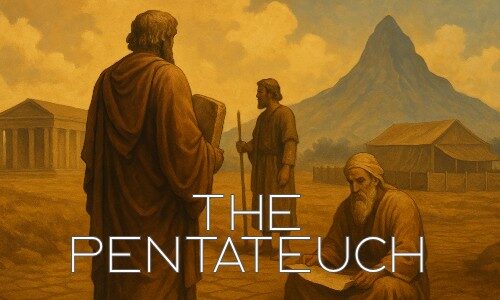A detailed study of the first five books of the Old Testament (Genesis, Exodus, Leviticus, Numbers, and Deuteronomy). It explores major themes like creation, covenant, law, and the Exodus narrative.
The Pentateuch
Level: Master’s
Course Length: 10 weeks (approx. 120–150 hours total if following full module path)
Delivery Mode: Competency-based, self-paced with required final exam
Course Overview
This course provides a detailed study of the first five books of the Old Testament: Genesis, Exodus, Leviticus, Numbers, and Deuteronomy. It explores the theological and historical themes of creation, covenant, law, holiness, and the Exodus narrative, as well as the literary structures that unify the Torah.
The course is competency-based:
-
Students may complete all modules to prepare for the final exam, or
-
If students already have a strong background, they may skip directly to the final competency exam.
Competency is demonstrated through mastery of Pentateuchal themes, history, and theology.
Learning Outcomes
By the end of this course, students will be able to:
-
Outline the content and structure of each book of the Pentateuch.
-
Explain the major theological themes (creation, covenant, law, holiness, worship).
-
Analyze the historical and cultural context of Israel in the Pentateuch.
-
Interpret representative passages within their literary and theological frameworks.
-
Demonstrate integrative understanding of the Pentateuch’s role in the canon.
Weekly Breakdown (10 Weeks)
Week 1: Introduction to the Pentateuch (8–10 hours)
-
What is the Torah?
-
Authorship and composition theories.
-
Overview of key themes: creation, covenant, law, worship.
-
Competency: Identify major debates and unifying themes of the Pentateuch.
Week 2: Genesis (Part 1: Primeval History) (12–14 hours)
-
Creation accounts, fall, flood, Babel.
-
Theological themes: image of God, sin, covenant beginnings.
-
Competency: Summarize theological significance of Genesis 1–11.
Week 3: Genesis (Part 2: Patriarchal Narratives) (10–12 hours)
-
Abraham, Isaac, Jacob, Joseph.
-
Covenant promises and fulfillment.
-
Competency: Explain the role of covenant in patriarchal narratives.
Week 4: Exodus (Part 1: Deliverance & Covenant) (12–14 hours)
-
Israel in Egypt and the call of Moses.
-
The Exodus event: plagues, Passover, Red Sea.
-
Sinai covenant and Ten Commandments.
-
Competency: Outline Exodus’ role in Israel’s identity.
Week 5: Exodus (Part 2: Worship & Tabernacle) (10–12 hours)
-
Tabernacle instructions and God’s presence.
-
Golden calf episode and covenant renewal.
-
Competency: Describe significance of God dwelling with His people.
Week 6: Leviticus – Holiness & Worship (12–14 hours)
-
Sacrificial system and priesthood.
-
Purity laws and holiness code.
-
Competency: Explain theological meaning of holiness in Leviticus.
Week 7: Numbers – Wilderness Journey (12–14 hours)
-
Census, organization, and leadership challenges.
-
Rebellion and God’s faithfulness.
-
Competency: Trace Israel’s journey and failures in the wilderness.
Week 8: Deuteronomy (Part 1: Covenant Renewal) (10–12 hours)
-
Moses’ speeches and review of Israel’s history.
-
Centralization of worship and Shema.
-
Competency: Explain Deuteronomy’s covenant theology.
Week 9: Deuteronomy (Part 2: Blessings, Curses, and Hope) (10–12 hours)
-
Covenant blessings and curses.
-
Prophecy of a coming prophet.
-
Competency: Analyze Deuteronomy’s role in shaping Israel’s theology.
Week 10: Integration & Competency Exam Prep (10–12 hours)
-
Unifying themes: covenant, law, creation, holiness, promise.
-
The Pentateuch’s role in later biblical theology.
-
Final Competency Exam (required).
Assessment
-
Competency Exam (100%): Students must demonstrate mastery by summarizing the structure, interpreting key passages, and explaining theological themes.
-
Optional formative assessments: quizzes, reading reflections, and study guides (not required).
Curriculum
- 10 Sections
- 22 Lessons
- Lifetime
- Week 1: Introduction to the Pentateuch (8–10 hours)What is the Torah? Authorship and composition theories. Overview of key themes: creation, covenant, law, worship.4
- Week 2: Genesis (Part 1: Primeval History) (12–14 hours)Creation accounts, fall, flood, Babel. Theological themes: image of God, sin, covenant beginnings.3
- Week 3: Genesis (Part 2: Patriarchal Narratives) (10–12 hours)Abraham, Isaac, Jacob, Joseph. Covenant promises and fulfillment.3
- Week 4: Exodus (Part 1: Deliverance & Covenant) (12–14 hours)Israel in Egypt and the call of Moses. The Exodus event: plagues, Passover, Red Sea. Sinai covenant and Ten Commandments.4
- Week 5: Exodus (Part 2: Worship & Tabernacle) (10–12 hours)Tabernacle instructions and God’s presence. Golden calf episode and covenant renewal.3
- Week 6: Leviticus – Holiness & Worship (12–14 hours)Sacrificial system and priesthood. Purity laws and holiness code.3
- Week 7: Numbers – Wilderness Journey (12–14 hours)Census, organization, and leadership challenges. Rebellion and God’s faithfulness.3
- Week 8: Deuteronomy (Part 1: Covenant Renewal) (10–12 hours)Moses’ speeches and review of Israel’s history. Centralization of worship and Shema.3
- Week 9: Deuteronomy (Part 2: Blessings, Curses, and Hope) (10–12 hours)Covenant blessings and curses. Prophecy of a coming prophet.3
- Week 10: Integration & Competency Exam Prep (10–12 hours)Unifying themes: covenant, law, creation, holiness, promise. The Pentateuch’s role in later biblical theology.3
Instructor

